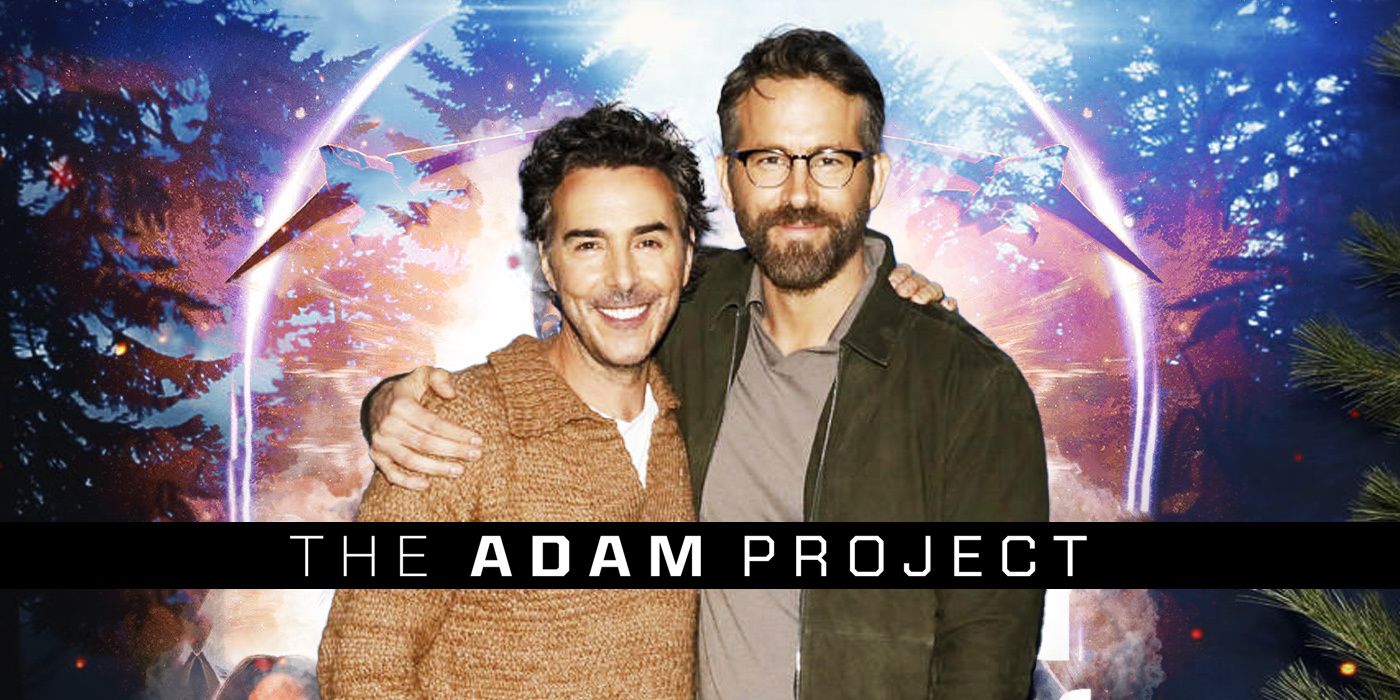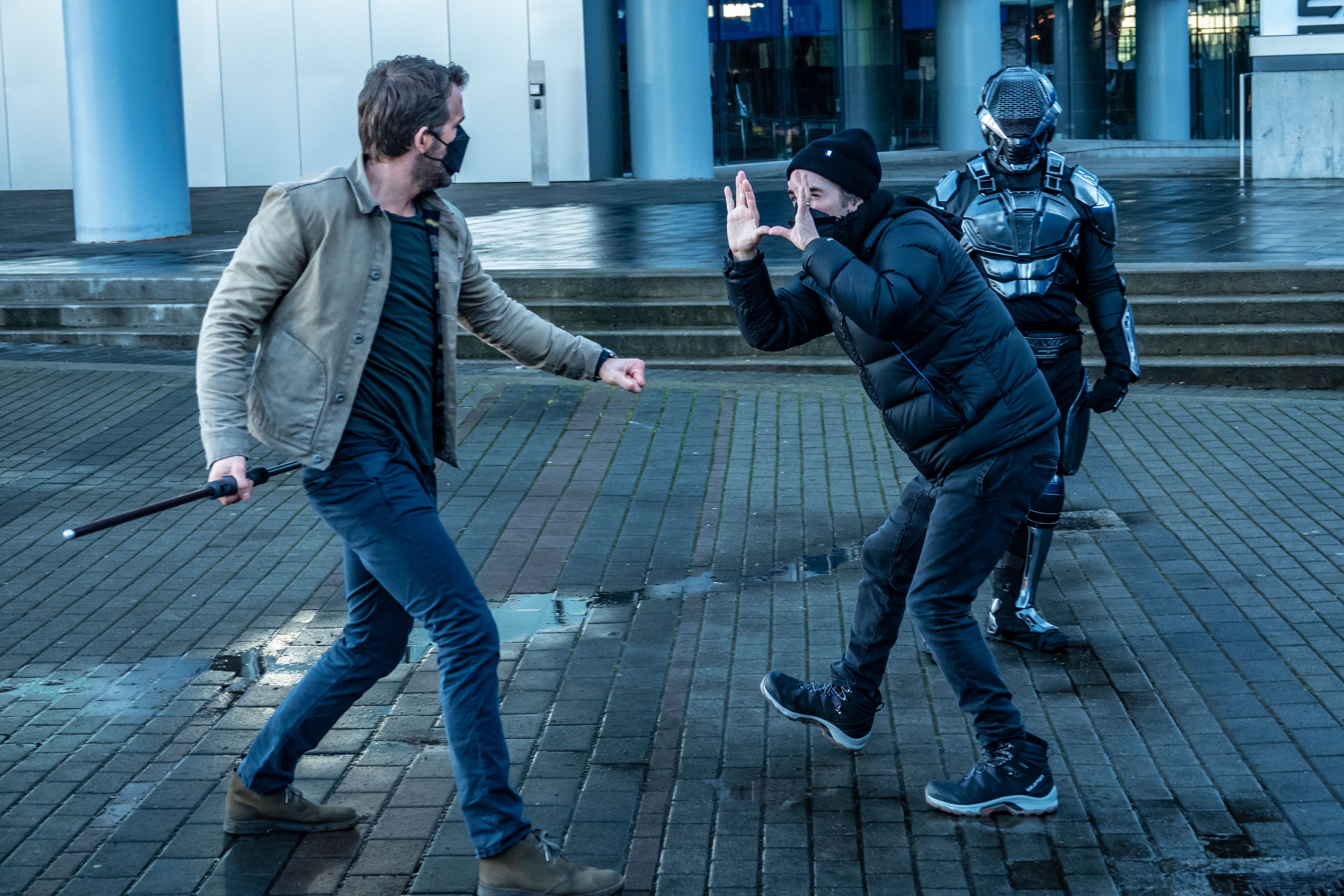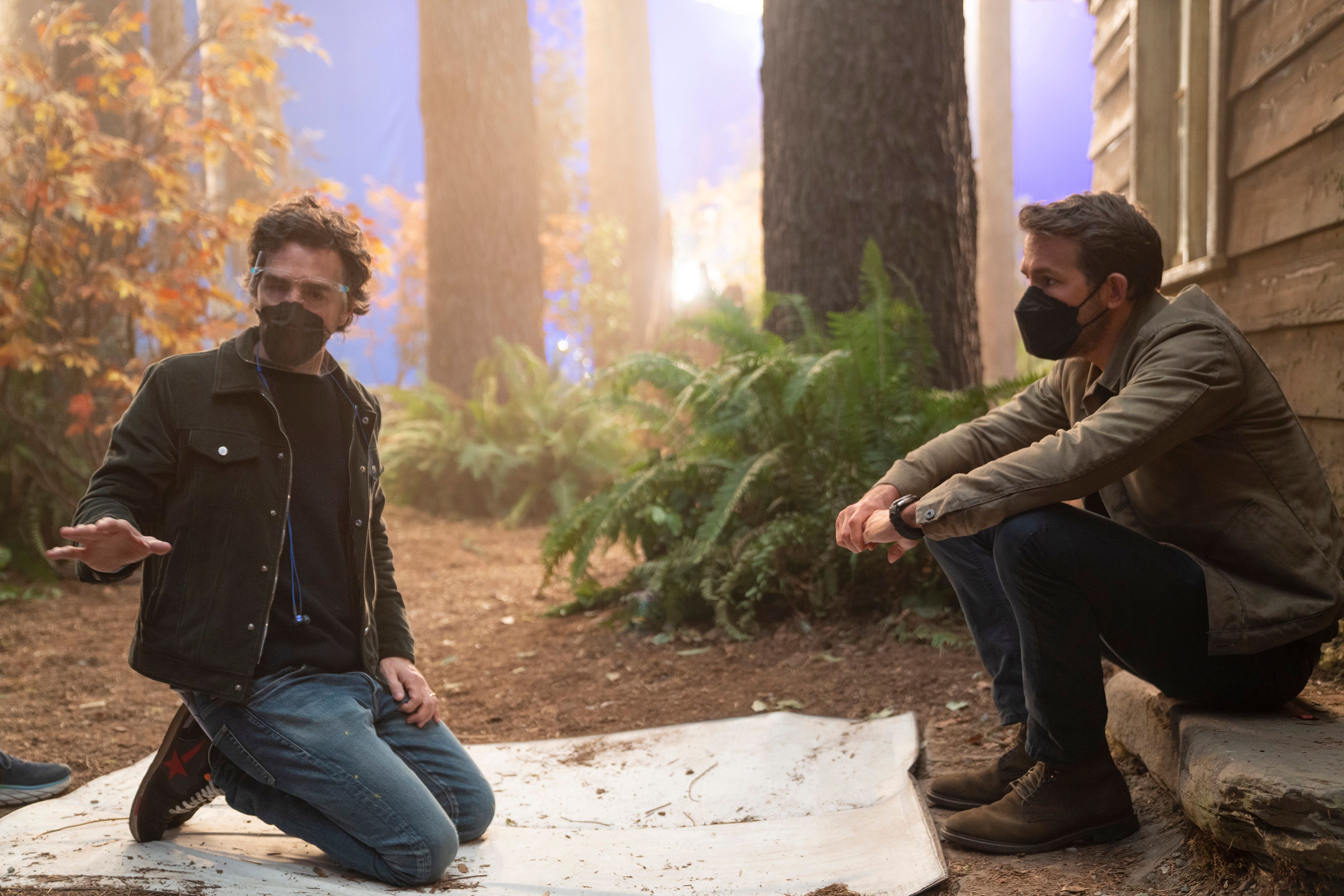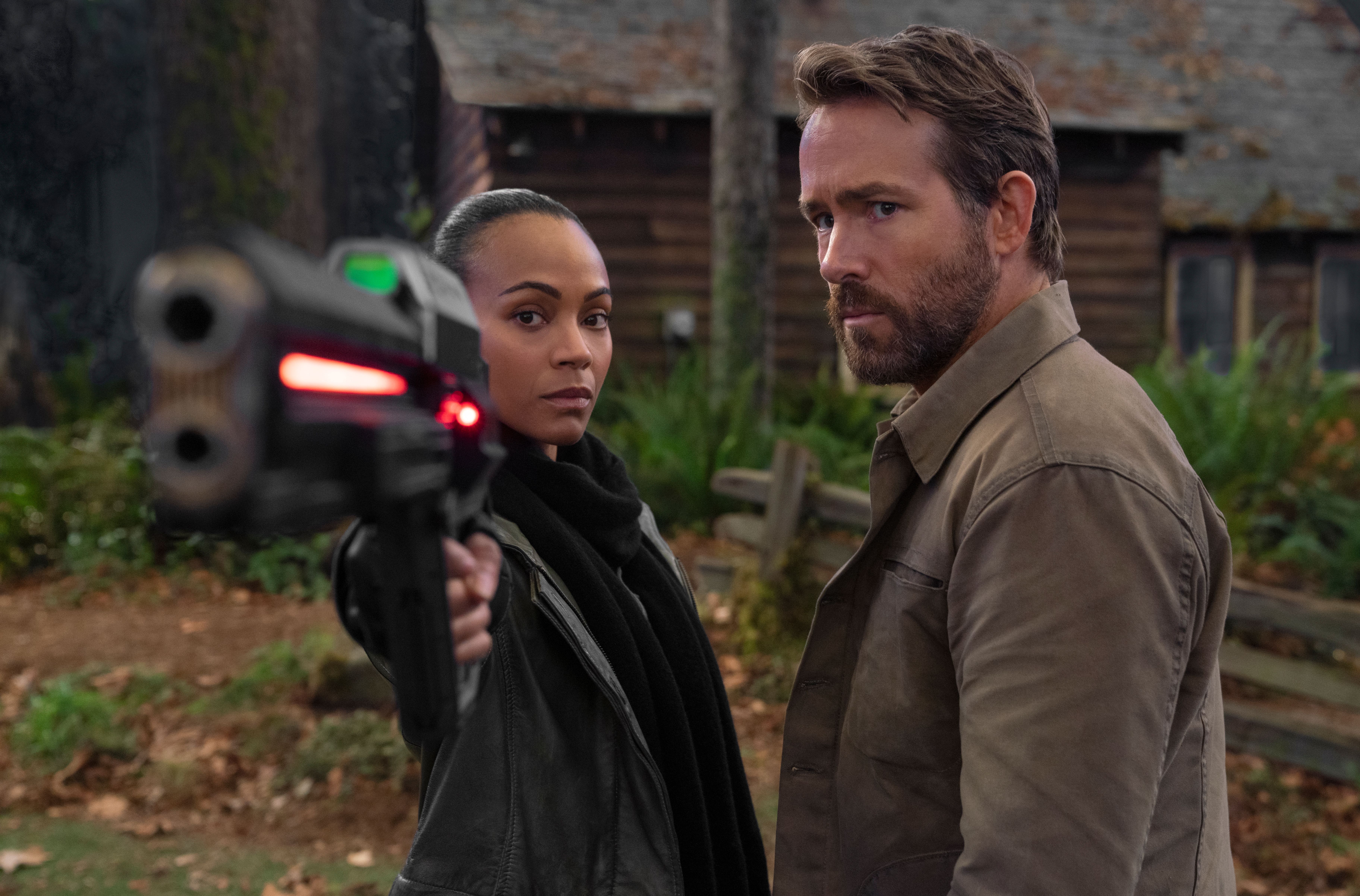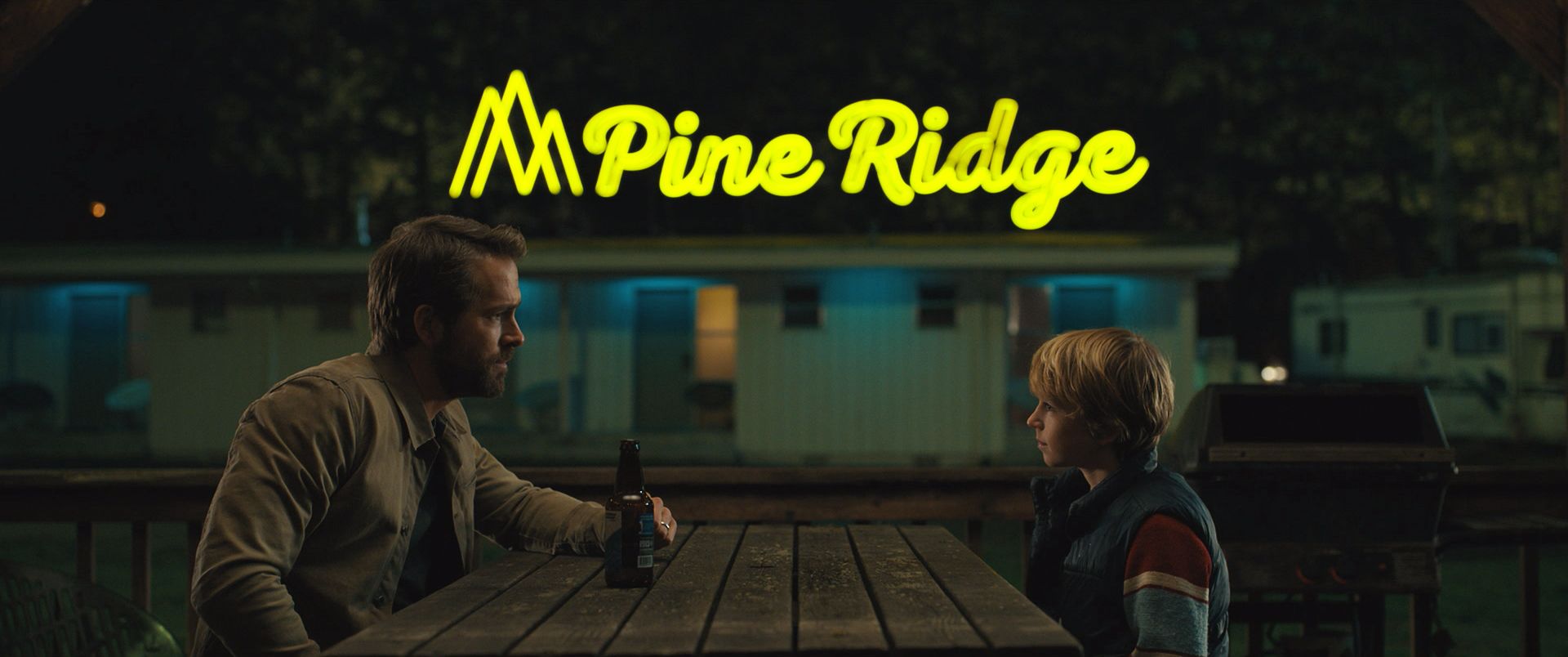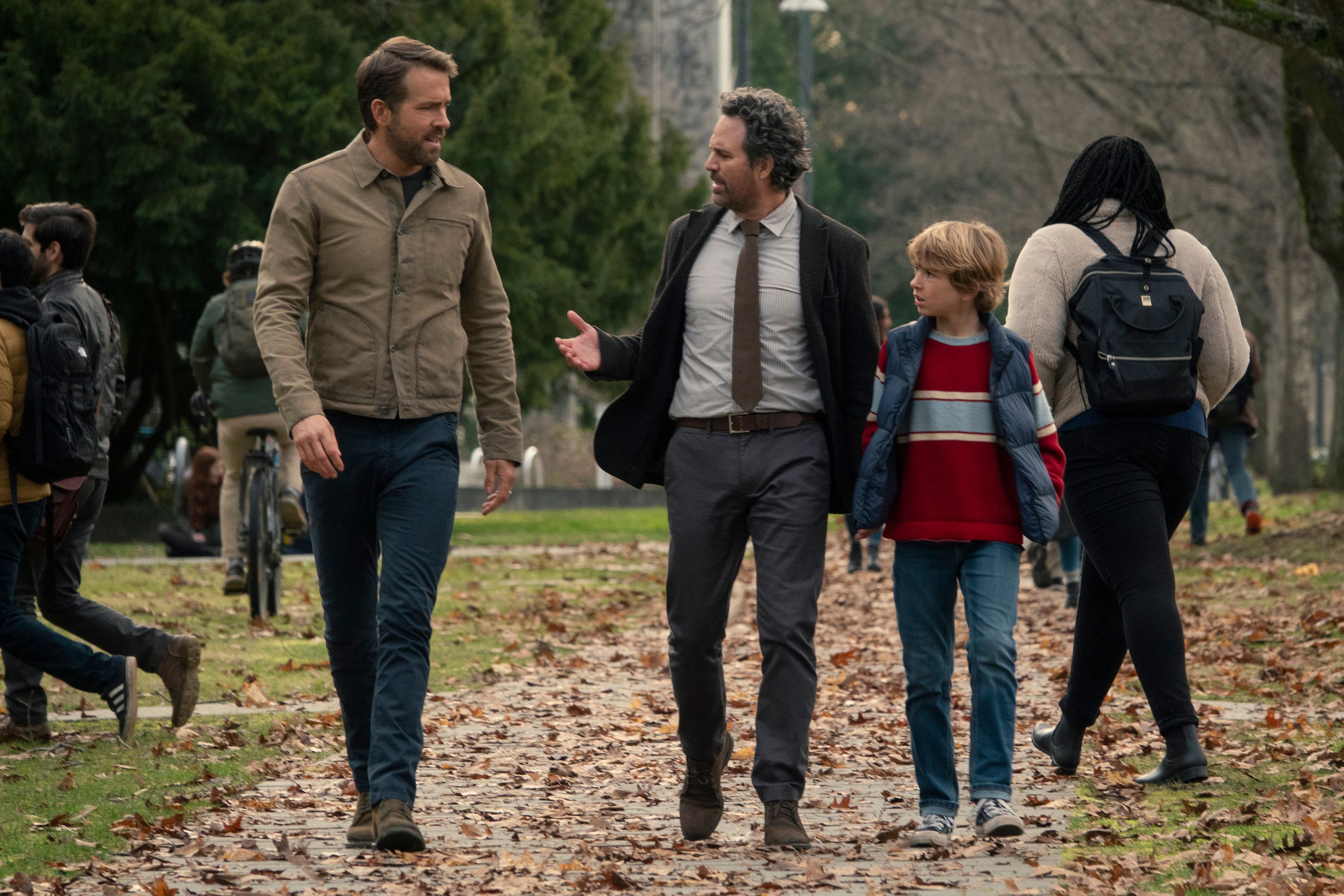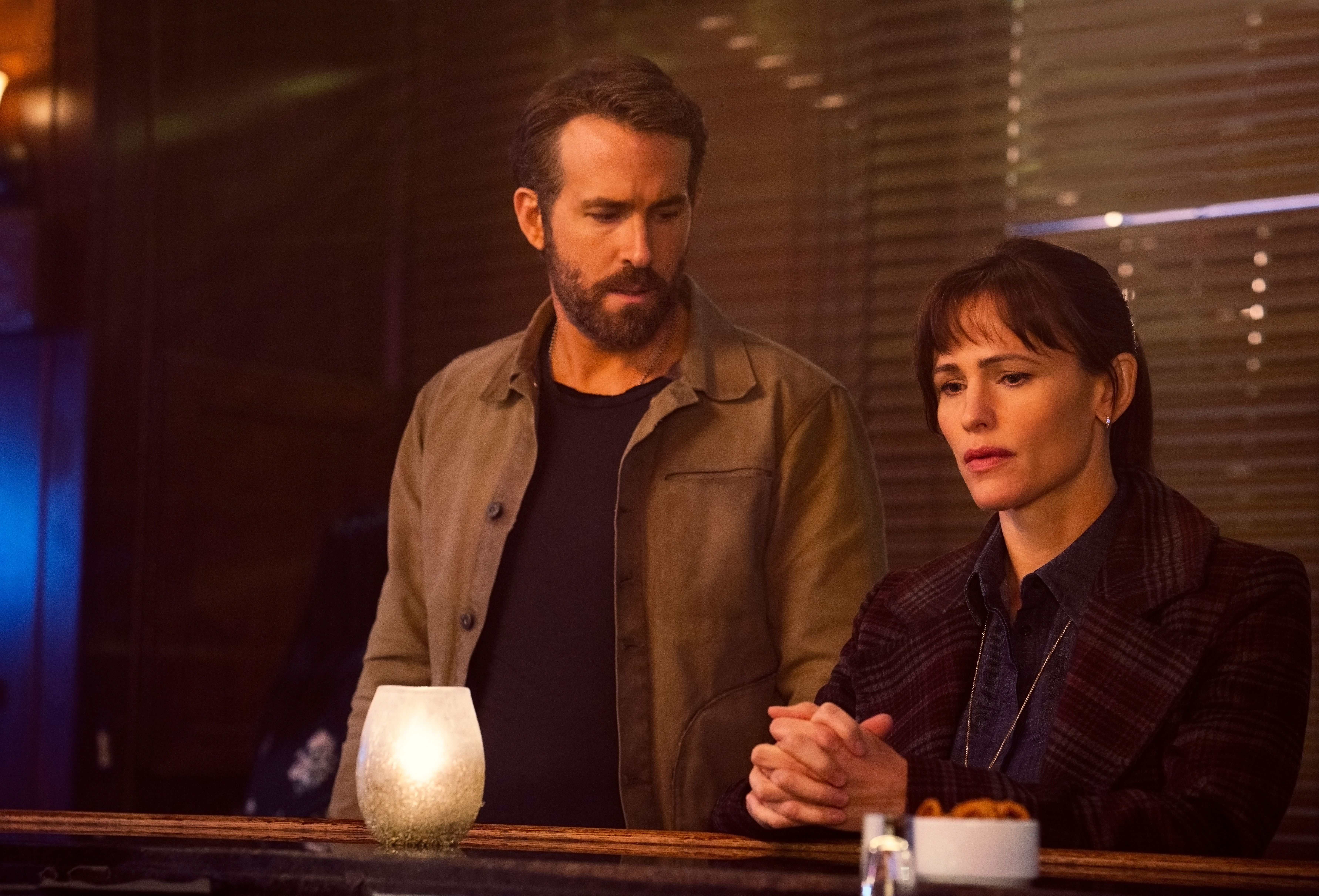If you have Netflix and want to check out an awesome new movie, I’d suggest pushing play on The Adam Project this weekend. Directed by Shawn Levy and starring Ryan Reynolds (you know the ones that made one of the best films of last year Free Guy), the original film has Reynolds traveling back in time to get help from his younger self (Walker Scobell) and his late father (Mark Ruffalo) to try and save the future. This is one of those "the less you know the better" stories, but I can promise you it’s one of those special movies that manages to blend an old school Amblin vibe with cool action, funny dialogue, and aspirational wish fulfillment. The Adam Project also stars Jennifer Garner, Catherine Keener, and Zoe Saldana.
Shortly after seeing the film, I was able to conduct an extended interview with Shawn Levy and Ryan Reynolds. In today’s installment, they talked about how The Adam Project happened, what people might be surprised to learn about the making of a movie in Hollywood, balancing all the different tones in the film, casting Walker Scobell and his fantastic performance, what it’s like making a movie at Netflix versus the legacy studios, what they learned from test screening the movie, and why they cut out a scene they both loved.
In addition, if you’re not aware, Levy played the dad in Taylor Swift’s All Too Well short film. I got him to briefly talk about making the video and I even got Reynolds to judge his performance. It’s a fun exchange.
Check out what they had to say in the player above, or you can read the conversation below. Again, The Adam Project starts streaming on Netflix this Friday and I can’t recommend it enough.
COLLIDER: The first question actually goes to Shawn. Shawn, I really need to know probably the most important thing I’m going to ask today, how did you get involved as the dad in the Taylor Swift music video?
SHAWN LEVY: I have been asked that question a lot, and I actually called my social media director/cultural guru, Ryan Reynolds, and I was like, “Ryan, people keep asking, I’m actually being asked to do interviews about it. Do I explain the whole convoluted origin story?” And my guru/social media advisor, Ryan Reynolds, VancityReynolds, said, “Just don’t. It’s cooler if you don’t.” So I’m actually going to violate my own maker, which is to be verbally promiscuous, and I’m going to play it kind of cool I don’t often play it.
Okay.
RYAN REYNOLDS: I'll just say this. That is not an off camera head of hair that Shawn Levy has over there. That should be a front and center mug right there, I'm afraid.
LEVY: There might have been a side letter with T Swift that if the hair was well featured, yes, I would come and play.
REYNOLDS: Who doesn't want to be in a Taylor Swift music video? Come on.
Ryan, I just have to ask you, as the actor of the group, did you have any critiques of Shawn's performance in his reaction at the table? Do you want to give him any notes for future things?
REYNOLDS: I actually thought he was fantastic. Shawn started as an actor, so that's what makes him such a great director. Get into that head.
LEVY: Yeah. But you know what?
REYNOLDS: He's great. Perfect. Flawless.
REYNOLDS: As I told you, Ryan, I was sitting at the table with Sadie and Dylan, and Dylan is telling me some improvised story and Taylor's like, "Action. Cut." I remember saying to Dylan, "I did not hear a word of what you were saying. All I was thinking about is, why are you doing that with your hands? Why are you laughing so maniacally?" It definitely gave me a taste of being back on camera, reminded me why I do not want it.
Ryan, your better half recently directed a Taylor Swift music video, made me think about you and directing. Have you actually thought about it? Or is that something that just doesn't interest you?
REYNOLDS: It genuinely doesn’t... Storytelling interests me in every way, shape, and form. Producing interests me in every way, shape, and form. Same with performing. And I get to work with guys like Shawn Levy. I don't know why I would try to think I can do that on my own. That would be idiotic. If I could direct something with Shawn Levy down the road someday, that would be nice. But no, I love the position I'm in. I love that I get to work with folks that I get to work with. I also just really feel like, why would I deprive myself of that amazing collaborator? I just think that's so important in everything that I do. I don't ever pretend to be a person who's just unilaterally deciding this or that. I love the creative process of having someone to bounce something off of. I love the creative process of trial and error, of ripping something apart and rebuilding it again. That's the thing that I'm most interested in, and I love doing that with someone.
LEVY: Also, Steve, I could take a deeper dive into this, but I really have to say, obviously Ryan has been a famous actor and a star for a long time, but I've never had an actual fellow producer alongside me who was as additive and is as additive to every step of the process as Ryan. I think, if I'm not mistaken, Ryan's produced four movies and it's two Deadpools and it's Free Guy and Adam Project. I think that the level of craft, the level of execution in all four of those... And by the way, it's also noteworthy that they're so different from each other. But I never knew that you could have in a fellow producer, someone where in script, in casting, on set, in the edit, in song selection, in score, in sound mix, these are things where Ryan and I have been very much in lockstep and as a duo on Free Guy and Adam Project. He's, as a filmmaker and so much more than just as a performer, he's the real deal.
You guys are really involved in the movie business. And I think from the outside, people think of the movie business in a certain way. What do you think might surprise people about the actual making of a movie that they just don't know about, obstacles you guys have to deal with all the time that just isn't talked about? I'm just trying to shine a light on trying to educate people.
REYNOLDS: I would say that, look, there's, there's vast differences between a set you might find yourself on of ours and someone else's. They tend to have their own language or feel, but it's like running any other business. That's the thing at least I find most shocking is that it's important. Certainly for Shawn and I, and the movies that we produce together, to come in on time, on or under budget and finish either on time or early and having a responsibility in that position is certainly important to me. I know it's important to Shawn. And then I think about little Walker Scobell, who's in The Adam Project with us, who just couldn't believe that there was more than four people who make a movie. His first day on set, he just looked like he had two dinner plates for eyes because he was expecting that it was going to be Shawn and me and maybe a cameraman and somebody who might have snacks. And he is not wrong, but there's hundreds of other people that go in and bake this cake. I think that was pretty eye opening for him, at least.
LEVY: I would add, Steve, maybe the other thing that people don't realize is every day at every stage, if you're open to ideas that come to you on the fly, they end up being movie defining decisions. So whether it's you're acting a scene and you're directing a scene and maybe I come up with... There's a scene in our movie where we're doing the scene. It was pretty good, but Ryan and I were both like, "It's pretty good." Then suddenly, I said to Walker, "Shine the flashlight in Ryan's face. Just bug him. Just shine the flashlight in his face." And then it led to basically the centerpiece of the scene where Ryan steals it out of the kid's hand, he's shines in the kids' face. You never know what are going to be the small, little ideas that make something better, and that carries every day, all the way through post-production.
REYNOLDS: If I could pile on one more thought to that, which is that the thing I genuinely love the most about the privilege it is to making movies is listening to the movie. When you listen to the movie, it will tell you things. And if you are quite ardent and dogmatic about the script and the story has to be this, you miss out on a lot of things. It's expanding on the same point that Shawn just made. But when you really sit there and put your ear to the ground and listen to the story you're telling, it says all kinds of things that you wouldn't expect it to say or tell you. If you listen to those things, magic happens. That's the part that I think keeps me awake at night and keeps me excited and energized to do this for as long as I can possibly do it.
Speaking of The Adam Project, I'm so curious, how long have you guys been developing this? Was this before Free Guy? During Free Guy? Talk a little bit about the Genesis of this thing.
LEVY: Well, the script had been developed for six or seven years before it came to Ryan and then me. So Jonathan Tropper, it was an idea that some other writers had and Skydance had developed it for six or seven years, with Jonathan Tropper. Then David Ellison told Ryan, Ryan and I were in post-production on Free Guy, David said, "I have this movie that I think you might like." As I recall it, Ryan, he pitched you the idea and you had a pretty immediate feeling that, "Oh, this could be something for us," right?
REYNOLDS: Yeah. What was odd though was that, again, it's one of those weird, I don't mean to be too esoteric, but kismet things, which is that Shawn and I were both looking for a story that told the father-son, mother-son story in a strange new light. We had been actually flirting with another project which had an interestingly similar dynamic to my dynamic with Mark Ruffalo in the film, who plays my father, who's roughly the same age as me. We love that wish fulfillment. But we've been flirting with this other film for a long time and it just felt square peg, round hole. It wasn't quite getting there. That's when David Ellison at Skydance, he came over to my apartment. That never happens. David Ellison, he's as big a big shot as it gets. So when he sits down and he is there to tell you something that he's very passionate about this story. You don't find that every day either in a person who's running a huge production company/studio like Skydance, but it was it. It rung all the bells. It was everything. I basically went running to Shawn to either beg him or threaten him, whatever came first or came to top of mind, to do this movie together. Thankfully, he saw the same mechanics that I saw that made it so romantic and beautiful.
One of the many things the film does so well is it manages all these different tones. It's emotional. It has heart. It has great action. It's really hard to pull off what you guys did. Can you talk about, how did you pull this off in terms of balancing all these different things?
LEVY: The longer I do this job, the more I think, well, tone is my job. Tone is a director's job. That is your job, to have some north star instinct about what the movie should feel like. I remember actually back when you and I met, Steve, circa Real Steel, the shooting of Real Steel, and Spielberg was one of the producers. I remember one of the conversations I had with him, I said, "There's an infinite number of shots at every given moment. How do you know the right angle?" And he said to me, "The way you picture it, that makes it right. The way you picture it, that's the right one." So there was something about, "Well, okay, I guess that's kind of all you have is your stink about what is the right way to do it."
So for me, tone, Free Guy is a very specific tone and it's very different than Adam Project. Ryan and I loved, by the way, that our back to back movies would be very different from one another. But on Adam Project, an old school blend of spectacle, warmth, humor, and aspirational wish fulfillment. It's a lot of words. It's a lot of hands on faders, to go with the mixing board analogy. As to where things go up and down, that's instinct. And that's the only skill I have is as the longer I do this job, trusting that, trusting that instinct.
REYNOLDS: I think it's also one of the things I love about working with Shawn is that Shawn has a very unique perspective on films. When he's directing a film and he's there on set, he's also, in that very moment, sitting in the audience. I feel like that is a superpower that cannot be overlooked because it really allows him, in the moment, a real objective point of view on what's happening and how this feels. And I like to think I'm sitting there next to him stealing his popcorn or whatever you want to say, but I love that as well. I think it's so important to do that in these moments, particularly in movies like this where those tones are so important and you're using the fader analogy that he used which I love, but that equalizer idea to add a little bit more here, a little bit less there.
Yeah, that feeling is so important. That's the thing I always grab onto the most is, what is the feeling this movie's trying to convey? What is that? I loved that. I loved how Free Guy was joy, and we made that particularly in an era that I certainly wouldn't be naive enough to say that we're completely out of yet, but it was a really tough period in history. The news cycles are just absolutely intense and it was this opportunity to tell a story via a film that really just expressed pure joy and radiated that, and I love that about it. And Adam Project similarly expresses a kind of warmth and nostalgic feeling that were films that we grew up with watching loved. Amblin movies took us away.
LEVY: I feel like so much of the movie marketplace now, it's like movies, they tend to be one of two things. They tend to be popcorn, escapism or emotional, weighty, thematic, idea based movies. I'd like to think, and I know my favorite movies, they get both. They are unembarrassed about wanting to entertain and they are absolutely determined to also make you feel, to also make you connect to themes that feel relatable and resonant. So with Adam Project, we wanted an old fashioned, eat your popcorn, enjoy the ride kind of movie. But we also believe that if we did our jobs right, you could connect to feelings in people that are universal, the way we look back at ourselves, the way we forgive our parents, the way we come to appreciate our parents, all of this, that's what the movie's about. So to entertain, but also to connect. Those were the dual goals for us on Adam Project.
In the film, you reference a lightsaber. There's also a nod in the third act that I won't reveal that happens. I'm just curious, with your relationship with Disney after Free Guy, was it easy to get these things in the movie or was it still a challenge?
LEVY: To be clear, Steve, there is no lightsaber in the movie, but we do have-
But you say lightsaber.
LEVY: We do. And when it came time to design that device, that is actually called a mag cell, I don't know why. We can ask Jonathan Tropper. it's like M-A-G, capital C, Y-L. Magnetic cylinder? I don't know. I had to design it. Basically, fear of lawsuit led me to multiple design iterations so that it was never just going to be a shafty beam of light, especially a double fighty thing, like Darth Maul usedto wield. So no, we didn't need permission this time because we're saving those cards for when we really need it on Free Guy movies.
REYNOLDS: So the kid, the kid really does react to it the way any kid would, which is, is that a lightsaber? And my character says, "It's not a lightsaber." And he's just convinced it is, which I love that as a bit of a runner.
Walker is so fantastic in this movie, and I absolutely believe he's a young Ryan. He has no professional acting experience in terms of this is his first movie. How did you both know this was the kid? Because he really has deliver a performance or this movie is not going to work.
LEVY: He has to deliver a performance and he has to be believably young Ryan. So those are different things. He needed the emotional heft and dimension to deliver pretty important emotional content, but he also needed be a freaking smart ass punk who probably got beat up a lot because of the mouth on him. I have no knowledge about that being a part of your history, Ryan, but it wouldn't shock me to hear that maybe it was, or certainly that your mouth was a weapon.
REYNOLDS: I have three older brothers, Shawn. It was all I had. So yeah.
LEVY: So, it helped that Walker is both inherently super talented, but he also, and we didn't know this when we hired him, he's obsessed with Deadpool. He has watched both Deadpool movies on inappropriate repeat, such that he can now recite them.
One of the things though about the way Walker talks is a lot of the dialogue he says, I feel like it's Ryan talking. I'm curious, Ryan, how much is what he's saying improvised on the moment? How much is that all scripted in advance? Because it clearly has your fingerprints all over this.
REYNOLDS: Oh, Walker's amazing. I fire off 10 alts to any given joke or moment. Also, we're always looking for it too. Again, Shawn and I both were sitting there listening to this movie. So there's all sorts of things that come about out of nowhere and work in surprising ways, not the least of which is you could throw that kid anything and he'll deliver it perfectly. It was just unbelievable. He felt like a much more extroverted version of me as a kid. I was much more shy than he was, but he really could turn that on. But actually, Walker in real life is quite shy. Walker in real life is a kid that I think lives in his head a little bit.
I'm not saying that's an easy thing necessarily, but I know it gives him a kind of dimension and depth that you don't find with a lot of kids at 12 years old. He really delivered that. I really felt like his mouth and the smart aleck or smart ass of behavior that he has was similar to mine, which was it was a maladaptive coping mechanism. It was a way to pave over other shit going on that I didn't really want to acknowledge as a young kid and as a young man.
You guys have worked all over the place in Hollywood. Shawn, both of you have worked for Netflix before. Can you talk about, is there any difference to making a film at Netflix versus the other studios or other streamers? I'm just curious about the dynamic behind-the-scenes.
LEVY: Well, this was my first movie for a streamer. I've made a lot of television, starting with Stranger Things for Netflix. I will say that I found this movie similar to my experience on Shadow and Bone and Stranger Things, in that they really do tend to trust the people they hired. So much like on the shows I do, I would say on Adam Project, we got the support, we got input when they thought something was worthy of adjustment. They're not going to be shy about giving you notes, but they don't feel like they're in your business.
So there is a lot of creative autonomy, but I don't want to fault to this narrative that, oh, well the legacy studios are up in your business all the time and Netflix lets you run free. The truth is that, as we learned with Free Guy, at the stage of career that Ryan and I have worked really hard to achieve, there's a bedrock of trust that we know how to make something responsibly and in a way that audiences will like. If you have that trust from the studio, as we did from Netflix, as we did from Disney and Fox and Free Guy, you're left mostly alone. So I would say-
REYNOLDS: I think that's also one hack that I think both Shawn and I shared this in common, which is that there's not a lot of layers with us. With respect to our relationships at the legacy studios and the streamers, when you're getting in touch with us, there isn't, I got to go through an agent or a manager or a lawyer or a publicist. We have an open line of communication that really fosters certainly accountability, which is a huge part of why we're able to, I think, make some of these movies and tell these stories, because that does, like Shawn mentioned, creative foundation of trust.
But also, one thing I love about Netflix is their real commitment to telling original stories. This doesn't happen every day, a movie like this, getting to make this, which isn't based on anything. And we felt so spoiled that we got to make Free Guy at Disney, which was another totally original, new idea and new concept, and they embraced it so wholeheartedly. But Netflix, that's what they do over here and it's pretty awesome, I've got to say.
Did you test screen The Adam Project? And what did you learn from those test screenings that impacted the finished film?
LEVY: We did test Adam Project twice, just as we tested Free Guy twice. The test screenings were extremely encouraging. I had not realized how much of a comedy the movie plays as until I heard it with the test audience. The numbers were very strong, as they had been on Free Guy. You know what's really interesting? There's a scene that a lot of people talk about. It's a scene in a bar with Ryan and Jen Garner, and they are-
We're going to get there.
LEVY: You know what was a shocker? When you do a test screening on a Hollywood movie, you get your scores, but they also get to rank. You're talking about 300 strangers rank their favorite scenes, their least favorite scenes. You look at those charts and you look for trends. That bar scene, a drama scene, a drama dialogue scene, every time, top two scenes. That doesn't happen with drama scenes. It is not rushed. There's no action. There's not a joke. It's just feeling. And that was where I realized, "Oh, you know what? We can trust the audience here because they're going to connect to the emotional part of the movie as much as the action and the comedy." So that was very affirming. And that I learned in test screenings.
Are there a lot of deleted scenes in the movie?
LEVY: I was just asked which ones I wanted to approve to put in the world. And there were only... I think we took out four in total and two of them are good enough that I'm going to put them out. I don't even know where, where does it go?
I was going to say, one should be a Collider exclusive and we will be happy to run it for you.
REYNOLDS: Done and Done.
LEVY: Then I'll tell you this, if they'll let us do that, our personal favorite is there was a scene between Ruffalo and Ryan, where basically the father says to the son, "Look, somewhere between the villain that you think I am and the hero that young you thinks I am, there's the real guy. I'm neither, and I'm just a guy doing the best I can." And it is so, I think, honest and true about the way we see our dads or need to see our dads. It's a lovely scene, but to Ryan's point, great scene as a standalone, but that's not enough of a reason to keep it in a cut. The movie needs to tell you what it wants. As we watched the flow of the narrative, it was like the body rejected that organ in a weird way. I'm coming up with crazy metaphors today, guys. Sound mixing boards, surgery and rejected organs. But that scene with Ruffalo and Ryan, that's one of my favorites, and I'm glad we'll somehow see it, maybe on Collider.

